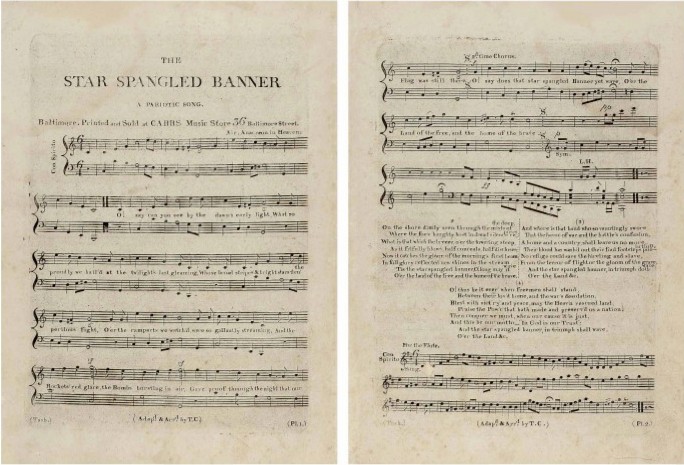December to be a Busy Month for the Auctions
- by Michael Stillman

The first printing of the Star Spangled Banner (courtesy of Christie's).
By Michael Stillman
The first three weeks of December will be one of the busiest times we have seen in a while for the world of book and ephemera auctions. Then, the hammers will fall silent for the year. Everyone will go home for the holidays and enjoy the spoils of their bidding, awaiting a more restrained pace which will come with the beginning of the new year.
December will offer some fabulous auctions with a couple of spectacular pieces. Elsewhere on this site, Americana Exchange founder Bruce McKinney writes about his sale on December 2 at Bonham's, New York - The American Experience: 1630-1890. This auction has generated great interest not just because it is one of the largest Americana auctions in years, but because of the generally unheard of terms and transparency Mr. McKinney has offered. There are no reserves, even for items estimated in the hundreds of thousands of dollars. He has listed when, where, and for what price he purchased his books, and credit has been offered for qualifying buyers.
However, this will not be the only auction on December 2. Down the street at Christie's, Beautiful Evidence: The Library of Edward Tufte will be up for sale. Mr. Tufte, in his professional career, writing and collecting, has crossed between the boundaries of science and art. He has written and taught about subjects such as statistics, while also being a sculptor. His varied interests are reflected in his collection, which includes such items as Galileo's Siderius nuncios magna… (first edition, 1610) estimated at $600,000 - $800,000.
The following day, Christie's New York will be at it again with a sale Fine Printed Books and Manuscripts Including Americana featuring a very special American icon. It is a copy of the rare first edition of the words and music to The Star Spangled Banner. It is one of only 11 known copies and the only one remaining in private hands. The story of America's national anthem is well known. Francis Scott Key witnessed the British bombing of Fort McHenry through a night-long battle during the War of 1812, only to fine the American flag still flying over the fort in the dawn's early light. The Americans had held back the British. Key penned his lyrics on the back of a letter that morning, and his lyrics, set to the tune of an old British drinking song, quickly became popular. Baltimore music publisher Thomas Carr took advantage of this popularity by printing this edition, a rush job that left out Key's name, and described it as "A Pariotic Song." It was not until 1931 that Key's song was finally recognized as the national anthem. This copy of the sheet music was bound up in an album of music owned by Mary Barnitz of York, Pennsylvania. She died in 1886 and its subsequent ownership is unknown. Her now tattered sheet music album was purchased at a small Pennsylvania auction by the current owner, who was surprised to find a first edition Star Spangled Banner within. Christie's has estimated its price at $200,000 - $300,00.
December 7th will see the auction of the spectacular Hesketh collection at Sotheby's in London. Lord Hesketh built his collection between the 1930s and his death in 1955, but the collection remained intact for another half a century as Lady Hesketh died only a few years ago. Hesketh did not collect by subject, but rather, bought the very best books of any sort he could find. Among the amazing items in this collection are a first, folio edition of Audubon's Birds of America (estimated approximately $6,250,000 - $9,400,000 in U.S. dollars) and a Shakespeare First Folio (estimated $1,550,000 - $2,350,000). Hesketh not only collected the most important works but the finest copies as well.